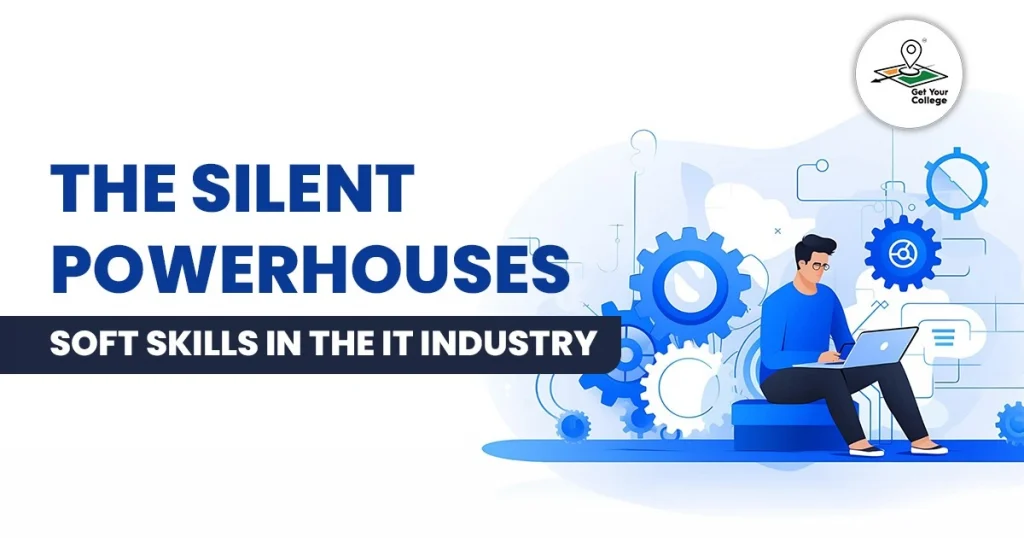In the IT industry, technical expertise is paramount, yet the often overlooked aspect of soft skills holds significant importance. Beyond coding mastery and algorithmic finesse, qualities like communication and adaptability are essential. These attributes shape not only the individual IT professional but also the trajectory of projects.
This blog underscores the critical importance of soft skills, delving into their role, necessity, and methods for enhancement. Soft skills bridge the gap between technical proficiency and effective collaboration, serving as the linchpin for success in an industry characterized by innovation and constant change. Understanding and cultivating these skills are imperative for navigating the complex interplay of technology and human interaction that defines the modern IT landscape.
Hard Skills:
Hard skills, such as proficiency in programming languages, database management, and cybersecurity protocols, are undeniably the backbone of success in the IT industry. These technical competencies provide measurable expertise, often serving as the primary criteria for hiring and advancement. However, the true effectiveness of hard skills lies in their integration with soft skills.
Soft skills, including communication, teamwork, adaptability, and leadership, complement technical proficiency to enhance an IT professional’s effectiveness. While hard skills demonstrate technical capability, soft skills enable professionals to collaborate effectively, lead teams, and adapt to changing circumstances. In the dynamic landscape of the IT industry, where projects often involve cross-functional teams and interaction with clients, stakeholders, and end-users, soft skills are indispensable.
The integration of hard and soft skills creates a well-rounded IT professional capable of not only delivering technically sound solutions but also effectively communicating with stakeholders, collaborating with team members, and adapting to evolving project requirements.
Thus, while hard skills provide the foundation, it is the synergy with soft skills that enables IT professionals to truly thrive and succeed in their roles.
Soft Skills:
Soft skills constitute a broad spectrum of interpersonal, communication, and emotional intelligence capabilities essential for fostering effective collaboration, problem-solving, and innovation within the workplace. These encompass a myriad of attributes, including communication, teamwork, adaptability, leadership, time management, and empathy.
Unlike hard skills, which are concrete and quantifiable, soft skills are more challenging to measure, yet their influence on individual performance and organizational dynamics is profound.
Effective communication lies at the heart of soft skills, enabling individuals to convey ideas clearly, listen actively, and navigate interpersonal relationships with finesse.
Teamwork emphasizes cooperation, conflict resolution, and synergy among team members to achieve common goals.
Adaptability entails the ability to embrace change, pivot strategies, and thrive in dynamic environments.
Leadership involves inspiring and guiding others, fostering a collaborative culture, and driving innovation.
Time management skills enable individuals to prioritize tasks, meet deadlines, and maximize productivity.
Empathy, crucial for fostering understanding and building rapport, allows individuals to connect with colleagues, clients, and stakeholders on a deeper level.
Soft skills play a pivotal role in shaping the effectiveness of individuals and the overall dynamics of teams and organizations. They contribute to a positive work culture, enhance employee morale and job satisfaction, and ultimately drive organizational success. While hard skills may open doors, it is soft skills that enable individuals to navigate challenges, build meaningful relationships, and thrive in the ever-evolving landscape of the modern workplace.
Need of Soft Skills:
The rapid evolution of technology has revolutionized the IT landscape, necessitating the integration of soft skills alongside technical expertise. In today’s interconnected world, where cross-functional teams collaborate on intricate projects, effective communication and teamwork are indispensable.
As IT professionals frequently engage with clients, stakeholders, and end-users, possessing robust interpersonal skills is imperative for fostering trust, comprehending requirements, and delivering satisfactory solutions. Moreover, in an industry characterized by perpetual innovation and change, adaptability and resilience are paramount for navigating challenges and remaining pertinent.
The demand for soft skills in the IT sector arises from the need to bridge the gap between technical proficiency and effective collaboration. Effective communication ensures that ideas are conveyed clearly and misunderstandings are minimized, fostering synergy within teams. Meanwhile, strong interpersonal skills enable IT professionals to cultivate meaningful relationships with clients and stakeholders, facilitating the alignment of technological solutions with business objectives.
Furthermore, the ability to adapt to evolving technologies and market demands is vital for maintaining competitiveness in the IT industry. Those who embrace change and exhibit resilience in the face of challenges are better positioned to capitalize on emerging opportunities and drive innovation.
In essence, soft skills are indispensable for navigating the complexities of the modern IT landscape. By complementing technical acumen with effective communication, teamwork, adaptability, and resilience, IT professionals can not only meet but exceed the expectations of clients, stakeholders, and end-users, thereby propelling their organizations towards sustained success in an ever-evolving digital ecosystem.
Tips to Improve Soft Skills:
Enhancing soft skills is a continuous journey that requires dedication and self-awareness. Here are some tips to cultivate and refine soft skills:
1. Continuous Learning:
Stay current with industry trends, communication methods, and leadership tactics by engaging in books, courses, workshops, and seminars. Continuous learning enhances skills and knowledge, ensuring professionals remain relevant and effective in the ever-evolving landscape of their respective fields.
2. Seek Feedback:
Seek constructive feedback from peers, mentors, and supervisors to pinpoint areas for enhancement and polish interpersonal abilities. Embracing feedback fosters self-awareness and personal growth, empowering individuals to cultivate stronger relationships and excel in collaborative environments.
3. Practice Active Listening:
Nurture active listening habits, empathize with diverse viewpoints, and offer thoughtful responses to enrich communication. By truly understanding others’ perspectives and engaging with empathy, individuals foster trust, deepen connections, and foster more meaningful interactions, leading to greater collaboration and mutual understanding.
4. Embrace Collaboration:
Participate in team projects, volunteer for cross-functional tasks, and cultivate a collaborative atmosphere to refine teamwork and leadership proficiencies. Involvement in diverse initiatives fosters adaptability, while promoting cooperation and leadership abilities strengthens team dynamics, enhancing productivity and achieving collective goals more effectively.
5. Develop Emotional Intelligence:
Invest time in comprehending emotions, mastering stress management, and fostering empathy to navigate interpersonal connections adeptly. By honing these emotional intelligence skills, individuals can foster healthier relationships, resolve conflicts more effectively, and create supportive environments conducive to collaboration and personal growth.
Role of Soft Skills:
Soft skills serve as the glue that binds together the diverse facets of the IT industry, empowering professionals to navigate challenges, foster innovation, and drive success. Whether it’s negotiating project timelines with clients, leading a team through a crisis, or presenting technical solutions to non-technical stakeholders, soft skills enable IT professionals to transcend technical barriers and deliver exceptional results.
Moreover, in an era characterized by digital disruption and remote work, the ability to communicate effectively, collaborate seamlessly, and adapt to change becomes even more paramount.
Conclusion:
In the dynamic landscape of the IT industry, where technological advancements occur at breakneck speed, the significance of soft skills cannot be overstated. While hard skills may open the door to opportunities, it is soft skills that pave the way for sustained success and professional fulfillment. By recognizing the pivotal role of soft skills, investing in their development, and integrating them into the fabric of organizational culture, the IT industry can unlock its full potential and thrive in an ever-evolving digital ecosystem.



